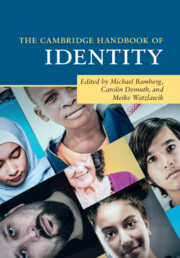Book contents
- The Cambridge Handbook of Identity
- The Cambridge Handbook of Identity
- Copyright page
- Contents
- Figures
- Tables
- Contributors
- 1 Identity: With or Without You?
- Part I The Origin and Development of the Concept of Identity
- Part II New Perspectives and Challenges
- 5 A Moral Perspective: Identity as Self-Interpretation
- 6 Researching Identities as Affective Discursive Practices
- 7 The Negotiation of Continuity and Change of Mapuche Women Weavers in Chile and Its Implications for (Non-Eurocentric) Identity Research
- 8 Identity and Voices: A Language-Dialogical Take
- 9 Psychoanalytic Perspectives on Identity: From Ego to Life Narrative
- 10 Erikson, the Identity Statuses, and Beyond
- Part III Methodological Approaches
- Part IV Current Domains
- Part V Where Is Identity?
- Author Index
- Subject Index
- References
6 - Researching Identities as Affective Discursive Practices
from Part II - New Perspectives and Challenges
Published online by Cambridge University Press: 29 October 2021
- The Cambridge Handbook of Identity
- The Cambridge Handbook of Identity
- Copyright page
- Contents
- Figures
- Tables
- Contributors
- 1 Identity: With or Without You?
- Part I The Origin and Development of the Concept of Identity
- Part II New Perspectives and Challenges
- 5 A Moral Perspective: Identity as Self-Interpretation
- 6 Researching Identities as Affective Discursive Practices
- 7 The Negotiation of Continuity and Change of Mapuche Women Weavers in Chile and Its Implications for (Non-Eurocentric) Identity Research
- 8 Identity and Voices: A Language-Dialogical Take
- 9 Psychoanalytic Perspectives on Identity: From Ego to Life Narrative
- 10 Erikson, the Identity Statuses, and Beyond
- Part III Methodological Approaches
- Part IV Current Domains
- Part V Where Is Identity?
- Author Index
- Subject Index
- References
Summary
The study of identity has proved to be a capacious interdisciplinary meeting point for scholars working at the interface of social formations and individual psychologies. As many in the social sciences are stepping towards affect and emotion, and turning away from discourse, what are the implications for the study of identity? What place remains for the discursively-constituted subject in identity studies, and how might new investigations proceed? Taking up fresh theoretical developments, this chapter explores what an affective-discursive practice approach brings to the study of identity, and its potential for investigating the semiotic, social and somatic constitution of identity (Wetherell 2012). We begin by mapping out the development of an affective discursive practice approach in light of the turn of affect as well as longer-standing trends in discursive psychology. From here, we outline the distinctive features of affective discursive analyses of identity, and reflect on the particular strengths of this approach for thinking through identity and identifications in their complexity, and responding to debates regarding the nature of agency and querying distinctions between “inner” and “outer” lives. In the final section of the chapter, we demonstrate how an affective-discursive practice approach enables rich, multilayered investigations of embodied identity practices, with potential to connect the dots between the pushes and pulls of socio-historical regimes and the more idiosyncratic play of personalized affective patterns and situated practices.
Keywords
- Type
- Chapter
- Information
- The Cambridge Handbook of Identity , pp. 120 - 143Publisher: Cambridge University PressPrint publication year: 2021
References
- 7
- Cited by

